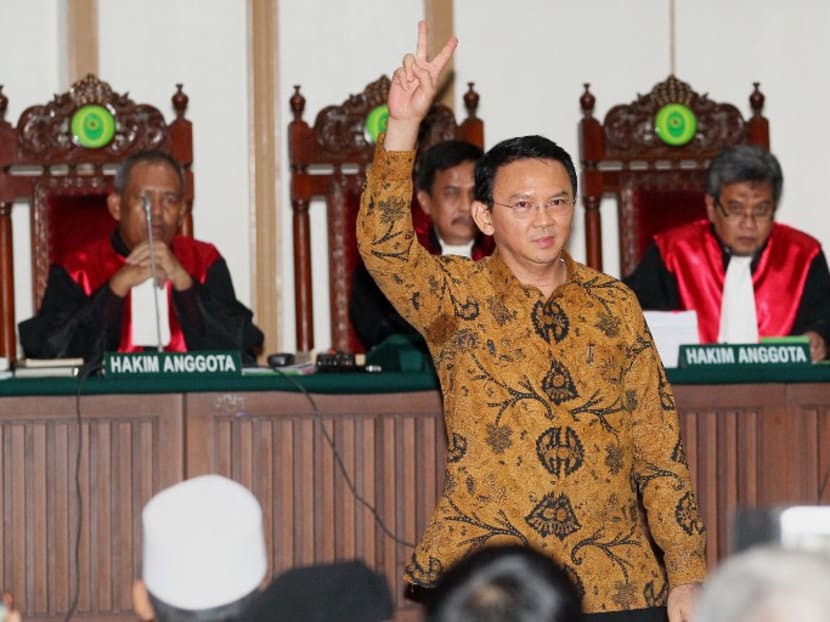Is Ahok’s blasphemy trial fair and open?
Journalists are usually allowed to cover a trial from inside the court in Indonesia. The all-day live coverage from the infamous “cyanide coffee murder” trial recently had Indonesians glued to their seats. Jakarta Governor Basuki “Ahok” Tjahaja Purnama's blasphemy trial was also extensively covered by the media, with several sessions being broadcast live on TV, but on Jan 4, during the fourth session of his trial, police made the extraordinary move of barring journalists and Judicial Commission officials from entering the court. Does this mean that the principles of fairness and openness in Mr Purnama’s trial have been compromised?
Journalists are usually allowed to cover a trial from inside the court in Indonesia. The all-day live coverage from the infamous “cyanide coffee murder” trial recently had Indonesians glued to their seats.
Jakarta Governor Basuki “Ahok” Tjahaja Purnama's blasphemy trial was also extensively covered by the media, with sessions being broadcast live on TV, but on Jan 4, during the fourth session of his trial, police made the extraordinary move of barring journalists and Judicial Commission officials from entering the court.
Does this mean that the principles of fairness and openness in Mr Purnama’s trial have been compromised?
To be sure, to ensure that the blasphemy trial is carried out fairly and openly, journalists and Judicial Commission officials have to be given a chance to witness the trial first-hand.
Indonesia's amended regulation on the Judicial Commission states that it has the authority to “maintain the honor, dignity and behavior of judges” among them by observing and monitoring proceedings of the court.
Meanwhile, the country's Press Law states that freedom of the press is a basic human right for Indonesian citizens and that journalists should not be subjected to censorship, bans or restrictions. The press has the right to seek, obtain and disseminate ideas or information.
In addition, the Press Law also states that the media are tasked with ensuring that the public's right to information is met.
President Joko "Jokowi" Widodo repeatedly promised that Mr Purnama's blasphemy trial will be carried out in a fair and transparent manner. He even called on the public to help the government monitor it.
During the Jan 4 trial, the presiding judge initially only asked television journalists not to broadcast the trial live and there were no restrictions on other journalists covering the trial. However, security officers later decided to ban all journalists from entering the court room.
According to the International Covenant on Civil and Political Rights, every person has the right to a fair and open trial. Media and the public may be excluded from all or parts of a trial for moral, public order or national security reasons, or if it is really necessary in the opinion of the court.
Nevertheless, the decision to exclude the media must be made through a ruling pronounced in an open session of the trial.
There seems to be no reason – moral-wise, public order-wise or national security-wise – to ban the journalists from covering Mr Purnama’s trial. If the judges had deemed it necessary, then they should have explained the reasons openly before the hearing.
Since the trial on Jan 4 presented prosecutors' witnesses, it is important to have objective, independent journalists in the court room. They can double-check the statements of the witnesses to ensure their validity and credibility, and to avoid misleading information.
Banning journalists and Judicial Commission officials from covering the trial have actually raised questions on the capacity and credibility of the witnesses presented by the prosecutors.
Rumors swirled after the trial that one of the witnesses was actually a member of a campaign team for one of Mr Purnama’s rivals in next month's Jakarta governor election.
Four of the six witnesses presented by the prosecutors on Jan 4 also did not see first-hand Mr Purnama’s speech on Pramuka Island, which was the trigger for the blasphemy allegation against the governor.
The blasphemy trial has already raised strong allegations of political intervention and pressure, so the government must make sure that each stage of the trial is carried out fairly and openly if they want to earn the public's support and build their trust.
Judges in the trial must provide assistance for everyone who wants to help monitor the trial, either directly or indirectly through television or print/online media.
If the judges find it necessary to hide the identity or testimony of the witnesses for safety and security reasons, they can request teleconference or video conference sessions, and/or put the witnesses under cover in an enclosed booth.
The Supreme Court can also issue an order for the Witness and Victim Protection Agency to protect the witnesses.
If Mr Purnama's blasphemy trial continues to ignore the principles of fairness and transparency, the eventual verdict could be considered a violation of human rights since Indonesia's own Human Rights Law states that everyone has the right to a fair trial conducted in a fair and transparent manner.
The National Police chief and Supreme Court chairman must ensure that journalists and Judicial Commission officials are allowed unfettered access to the rest of the trial, if only to avoid the trial having its own credibility and validity questioned. JAKARTA GLOBE
ABOUT THE AUTHOR:
Mimin Dwi Hartono, is a senior staff at Indonesia’s National Commission of Human Rights. All views expressed in this article are his own.







